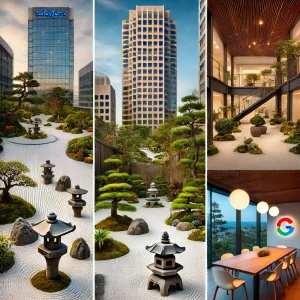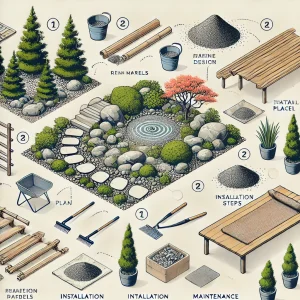In today’s fast-paced business world, finding ways to enhance both serenity and productivity in the workplace is crucial. One innovative approach gaining popularity is incorporating Zen gardens into commercial spaces. Zen gardens, rooted in ancient Japanese culture, promote tranquillity, mindfulness, and balance. This blog explores how Zen gardens can transform commercial environments, offering specific examples, design tips, and practical steps for businesses to create serene havens.

The Principles of Zen Gardens
Zen gardens, Japanese rock gardens or karesansui, are minimalist landscapes composed of rocks, gravel, sand, and carefully placed plants. The primary elements include:
- Rocks: Represent mountains or islands, symbolizing endurance and stability.
- Gravel/Sand: Raked into patterns representing water, reflecting fluidity and calm.
- Plants: Typically evergreen, symbolizing resilience and life.
- Water Features: Optional but can enhance the garden’s tranquil atmosphere.
These elements are arranged to evoke a sense of natural beauty and meditative stillness, making them perfect for commercial spaces seeking to create a peaceful environment.

Benefits of Zen Gardens in Commercial Spaces
- Enhanced Productivity: The calming effects of Zen gardens can reduce stress and improve focus, leading to higher employee productivity.
- Improved Well-being: A serene environment promotes mental well-being, reducing anxiety and fostering a positive work atmosphere.
- Aesthetic Appeal: Zen gardens add a unique and visually appealing element to any commercial space, impressing clients and visitors.
- Increased Creativity: The simplicity and beauty of Zen gardens can inspire creativity and innovative thinking.

Examples of Successful Zen Business Gardens
- Salesforce Tower, San Francisco Salesforce incorporated a Zen garden into their office space on the 61st floor, offering employees a serene escape from the bustling city below. The garden features carefully placed rocks, raked gravel, and minimalistic plantings, providing a peaceful area for contemplation and relaxation.
- The Peninsula Tokyo This luxury hotel in Tokyo includes a stunning Zen garden in its design. Guests can enjoy the tranquillity of the garden, which features traditional elements like stone lanterns, raked gravel, and water features, creating a serene oasis in the heart of the city.
- Google Campus, Mountain View Google’s commitment to employee well-being is evident in their inclusion of Zen gardens. These gardens offer employees quiet spaces for reflection, helping to reduce stress and boost productivity.

Design Tips for Creating Zen Business Gardens
- Simplicity is Key: Keep the design minimalistic, focusing on a few key elements to avoid clutter.
- Natural Materials: Use natural materials like stone, wood, and gravel to maintain an authentic look.
- Balanced Layout: Arrange elements in a balanced and harmonious way to create a sense of order and peace.
- Water Features: Incorporate features like small ponds or fountains to enhance the garden’s tranquility.
- Evergreen Plants: Choose low-maintenance, evergreen plants that symbolize endurance and stability.

Practical Steps for Businesses
- Identify a Suitable Space: Choose a quiet area dedicated to the Zen garden within your commercial space.
- Plan the Design: Work with a landscape designer familiar with Zen garden principles to plan the layout and elements.
- Source Materials: Obtain natural materials such as rocks, gravel, sand, and plants from reputable suppliers.
- Installation: Carefully install the elements according to the design plan, ensuring each component is thoughtfully placed.
- Maintenance: Regularly maintain the garden by raking the gravel, pruning plants, and cleaning water features.

Addressing Challenges and Misconceptions
Challenge: Space Constraints
Solution: Zen gardens can be adapted to fit smaller spaces, such as a corner of an office or a rooftop terrace, without losing their calming effect.
Misconception: High Maintenance
Reality: While initial setup may require investment, Zen gardens are generally low-maintenance, especially when using hardy, evergreen plants and simple gravel or sand patterns.
Challenge: Employee Engagement
Solution: Encourage employees to take breaks in the Zen garden and consider holding small meetings or meditation sessions to maximize benefits.
Zen business gardens offer a unique opportunity to create serene and productive commercial spaces. By incorporating the principles of Zen design, businesses can foster a calm, focused, and aesthetically pleasing environment that benefits both employees and visitors. With careful planning and thoughtful execution, any commercial space can be transformed into a tranquil haven that enhances well-being and productivity.